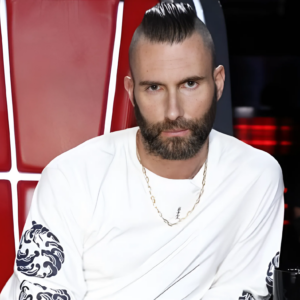A new kind of masculinity is dominating music — leaving little room for yesterday’s pop idol.
In the year 2024, the name Justin Timberlake comes with a lot of baggage.
His Super Bowl halftime show performance six years ago — which coincided with the release of his last album, Man of the Woods — kicked off a serious round of discourse about his 2004 halftime show performance and the wardrobe malfunction that tanked Janet Jackson’s career while leaving Timberlake unscathed.
Then there was the way he handled his highly publicized 2002 breakup with Britney Spears, feeding into the sexist commentary surrounding her — the details of which resurfaced in the 2021 documentary Framing Britney Spears. In Spears’s 2023 memoir, The Woman In Me, she revealed more embarrassing revelations about Timberlake, further igniting fiery discussions about his privilege as a white man in an industry that unfairly punishes his Black and female counterparts. There have been cries of appropriation and of infidelity.
Now, after years away from the spotlight (and one Instagram apology), Timberlake is releasing a new album titled Everything I Thought It Was. So far, its lead single (“Selfish”) and promotional track (“Drown”) point to a more mellow, R&B-lite direction for the singer — with the exception of the gospel-flavored song “Sanctified,” which previewed on Saturday Night Live. And the album’s artwork, influenced by 1971’s Willy Wonka and the Chocolate Factory and Federico Fellini’s masterpiece 8 ½, hints at an emphasis on visuals.
It seems as though Timberlake is ready to reclaim his title as the millennial king of pop. But in a culture that is now seeking to reckon with the sins of the ’90s and early aughts, can he rise above being viewed as a cultural misstep? Or is a decline in relevance the only natural trajectory for an objectionable, 43-year-old white dude in our current pop landscape where “sensitive” male artists like Bad Bunny and Harry Styles reign supreme?
Justin Timberlake’s “bad boy” image always had an expiration date
Justin Timberlake’s current image — dancing on stage in khakis and promoting songs for the Trolls soundtrack — is a far cry from the version the singer put forth after breaking out of NSYNC.
By the time of his 2002 solo debut, Justified, Timberlake had begun to shed his boy-band identity and embrace an edgier posture in his music and romantic life. Like many white pop stars in the early aughts, he also experimented with street fashion, cornrows, and other Black aesthetics. In The Woman in Me, Spears alleged a cringey interaction between Timberlake and R&B singer Ginuwine that signaled a desire for Blackness. Ultimately, his iteration of a “bad boy” read as manufactured and relatively safe. As Pitchfork contributor Julianne Escobedo Shepherd explains, “His masculinity was couched in a nonthreatening, boy-next-door persona that relied immensely on his whiteness, even as he was drawing on Black music and collaborating with Black musicians.”
Timberlake’s affinity for Black music and soulful vocal styling is often attributed to his Southern Baptist roots — he performed in his church choir — or his upbringing in Memphis, Tennessee, a breeding ground for soul and rock ’n’ roll. As a member of NSYNC, he dabbled in a commercialized form of pseudo-R&B. But his work on Justified was the start of his gaining acceptance in Black spaces and establishing decades-long relationships with producers like Timbaland and Pharrell Williams. Unlike the marginalized artists he was often trying to emulate, his whiteness afforded him an appearance of innocence and goodwill in the public eye that could easily be weaponized.
“He was very effective at using his boy-band past and white, blond, blue-eyed looks to shore up the general victim narrative that was central to his early career,” Escobedo Shepherd says. It was the tactic he used in the 2002 video for his hit single “Cry Me a River,” in which he not-so-subtly indicts Spears as a cheater while placing himself in the role of a guy who has revenge sex in his ex’s home and continues to stalk her afterward.
:no_upscale()/cdn.vox-cdn.com/uploads/chorus_asset/file/25334614/GettyImages_76235991.jpg)
“Justin Timberlake was the man in the early 2000s,” says Kelli Williams, co-host of the podcast Beyond the Blinds. “He broke up with Britney. He’s dating Alyssa Milano. He’s [rumored to be] dating Scarlett Johansson. But it’s like what Jennifer Aniston said about Brad Pitt: There’s a sensitivity chip missing.”
That lack of sensitivity would only really be interrogated years later. Many critical analyses at the time were focused on Timberlake’s unique stardom in an era otherwise flooded with rappers and aging male rockstars. Some music writers were excited to name him the heir to Michael Jackson and Prince for his impressive vocal range, slick dance moves, and proficiency performing Black music, while others were still figuring out whether he was a hack.
Following the Grammy-winning Justified and a detour into acting, he amped up his persona as a sex symbol with the more experimental 2006 album FutureSex/LoveSounds. The record saw Timberlake play with structure — incorporating reprises and interludes — as well as different genres, including funk and techno, and some annoying beatboxing. Critics were impressed, or at least awed, by his boldness and what they saw as his ingenuity as an artist.
“IT’S LIKE WHAT JENNIFER ANISTON SAID ABOUT BRAD PITT: THERE’S A SENSITIVITY CHIP MISSING”
Timberlake would retreat to Hollywood again after his sophomore album. In the early 2010s, he booked roles in a series of buzzy movies. In The Social Network, he gave a deliciously dirtbaggy portrayal of Napster founder Sean Parker; in Friends With Benefits and In Time, he was positioned as the sexy leading man. He also appeared on Saturday Night Live numerous times, showcasing himself as a charismatic, well-rounded talent. When he returned to music in 2013 with the first half of the double album The 20/20 Experience, he seemed to have attained some self-awareness about the unsavory reputation he had gained as a younger man. “I don’t want people to think I’m a self-obsessed sex machine,” he told British GQ in 2012.
His third record saw a softer, more romantic side of Timberlake, with sultry serenades that reflected his personal life, including his marriage to actress Jessica Biel. His newfound maturity was best represented in the album’s blockbuster single “Mirrors,” which — despite its arguably narcissistic lyrics — signified his commitment to monogamy.
Unfortunately for Timberlake, he would experience a significant fall from grace in the following years, both as an artist and as a wife guy.
In the 2010s, Timberlake’s complicated relationship with Black culture finally caught up to him
Timberlake’s relationship to Black music has long been polarizing, an object of criticism for some and a sign of credibility to others. Throughout his career, Black organizations like the BET Networks and the NAACP have nominated him for awards and welcomed him at ceremonies. He’s gotten props from legendary Black artists, including Stevie Wonder, who praised him for having “absorbed a lot of different kinds of music” in a Time 100 tribute. Despite being embraced by the rap and R&B worlds, though, he’s found himself at the center of heated discussions about cultural appropriation.
The strange landscape of pop music in the 2010s generated many of these online conversations. At the time, white rappers like Macklemore and Iggy Azalea were dominating the charts, and singers like Katy Perry and Madonna were donning hood aesthetics, which some labeled as appropriation. During and following his 20/20 Experience era, Timberlake was receiving that criticism, too — and some critics, including rapper Vic Mensa, called out his silence around the Black Lives Matter movement. In 2016, Timberlake drew more heat after he responded condescendingly on Twitter to a Black journalist who accused him of “appropriating [Black] culture.”
Just a year and a half later, Timberlake caused a stir with the announcement of his country-inspired fifth album, Man of the Woods. At first glance, it appeared that Timberlake was abandoning his signature urban sound to appeal to a broader (and whiter) fanbase. Ultimately, as Northwestern University professor and author Lauren Michele Jackson wrote for Vulture in 2018, the frenzy over his perceived genre switch wasn’t really warranted. In an interview with Vox, Jackson says the eclectic album was “very in line with Timberlake’s amalgamative tendencies.”
She says that his aesthetic pivot felt pointed in the eyes of critics due to our tense political climate: “The charge [against Timberlake] was inauthenticity. Funny enough, that is the same charge belatedly brought against his performing in the genre that yielded his fame in the first place.”
THE SEX APPEAL THAT FELT SO CRUCIAL TO TIMBERLAKE’S IMAGE SEEMED TO HAVE ENTIRELY DISSIPATED
Nevertheless, the critical reception to Man of the Woods was mixed at best, and the album lacked the inescapable bangers he had produced in the past. Timberlake’s title as pop’s reigning king suddenly felt dubious. At one time, his pushing of racial boundaries in his music had made him a virtuoso. But in hindsight, it made him seem like a fraud. The year after he released Man of the Woods, Timberlake’s marriage also saw trouble after he was caught holding hands with his co-star in the film Palmer, Alisha Wainwright, leading him to release an apology. Meanwhile, the reappraisals of his relationships to both Jackson and Spears added extra precarity to his crumbling reputation. Could he ever return to music in an acceptable form?
Is Justin Timberlake irrelevant in 2024, or does his stardom just look different?
:no_upscale()/cdn.vox-cdn.com/uploads/chorus_asset/file/25334580/GettyImages_1677226784.jpg)
In June 2022, a viral video of Timberlake doing the Beat Ya Feet dance — some fast and fancy footwork created by Black Washington, DC, teens in the ’90s — at Pharrell Williams’s Something in the Water Festival seemed to indicate that his next music venture would be an uphill battle for several reasons. Not only were the once-revered dancer’s moves labeled awkward, but social media also got a kick out of his paternal appearance — his khakis and patterned button-up made him look like a middle-aged dad at a cookout.
The sex appeal that felt so crucial to Timberlake’s image in the early 2000s seemed to have entirely dissipated in his post-Trolls era. The reaction was less about his actual looks and more about how expectations for the way male pop musicians present themselves have changed. In a New York Times piece, writer Lindsay Zoladz pointed to a trend of younger male pop stars like Bad Bunny, Harry Styles, Lil Nas X, and even rapper Jack Harlow embracing a gender-bending, “softboi” brand of masculinity — something Timberlake hasn’t attempted. On the red carpet, he sticks to his refined, GQ-in-2012 style; onstage, well, you saw those khakis.
Most important, though, is Timberlake’s new music. “Selfish,” the lead single from Everything I Thought It Was, had a lukewarm reception, debuting at No. 19 on the Billboard Hot 100. The song itself was ultimately overshadowed by Britney Spears’s fan army, which trolled Timberlake by streaming her 2011 song of the same name — at one point, Spears’s “Selfish” beat Timberlake’s on the iTunes charts. Fab drama aside, the midtempo, R&B-tinged single, which drew comparisons to Nick Jonas’s “Jealous,” sounded shockingly generic.
The lyrical content of “Selfish” felt bland and distanced as well, given the turmoil that has defined his career and personal life recently. Host of the Pop Pantheon podcast DJ Louie XIV says that the singer struggles to balance his showmanship with younger listeners’ desire for intimacy. He points to Timberlake’s contemporary Beyoncé as someone who’s married their theatricality with a “sense of deep, personal revelation that speaks to the demands of the moment.”
“Everything is much more driven by intimacy and relatability, a feeling that you know your stars of choice and that they are accessible to you and share your concerns,” he says.
It’s probably not a coincidence then that one of the biggest male artists at the moment, Drake, built off a chart-topping career by lamenting his love life and anxieties — no matter how childish — as a public figure. Pop superstars Styles and Ed Sheeran have also found success using diaristic lyrics. And the latest male sensation in the pop sphere, indie-folk singer Noah Kahan, has seemingly captivated Gen Z, in part, by singing about and advocating mental health.
Still, the announcement of Timberlake’s Forget Tomorrow World Tour has been met with high demand, selling out in multiple venues and requiring additional dates. A search of the artist’s name on TikTok still shows accounts that are thirsting over the musician and fans who are responding eagerly to his latest Saturday Night Live performance and reunion with NSYNC. Timberlake can still count on the collaboration with his former boy band for engagement.
“Nostalgia is the best drug out there right now,” says Williams. “I think the only way for Justin to really get into the public’s good graces is to work with NSYNC. I don’t think NSYNC is beneath him, but it makes him look humble that, after all these years, he can go back to his roots.”
Whether or not Timberlake can compete on the charts with the Harry Styleses of the world may not be a concern for his die-hard fans. For listeners who grew up alongside him, there’s a level of amusement in watching someone mature and navigate a new stage of their life, even if it’s a little awkward. While Timberlake’s “dad” era may be cringe to some, it’s offered him an air of innocence that he’s struggled to maintain publicly — and ultimately may never fully get back.
News
Joey Fatone Says *NSYNC Not On Call for Justin Timberlake Amid Collaborations
Reflecting on the recent reunion at Wilton, the atmosphere was electric, filled with fun and excitement. Despite Justin Timberlake’s busy schedule with his solo album and tour, there’s hope for future collaborations and tours with *NSYNC. The conversation delves into…
Novak Djokovic Matches Rafael Nadal’s Masters 1000 Milestone
© Clive Brunskill / Staff – Getty Images Sport Novak Djokovic returned to Indian Wells after five years, entering the season’s first Masters 1000 event and matching his great rival Rafael Nadal. Novak notched his 128th Masters 1000 appearance, repeating Nadal’s feat and…
Andy Roddick criticises Novak Djokovic for ‘desperation move’ in Indian Wells controversy
Luca Nardi and Novak Djokovic after their match© PA Images Former world No 1 Andy Roddick has weighed in on the controversy that arose during Novak Djokovic’s shock defeat to Luca Nardi at the 2024 Indian Wells Open last week. The…
‘Who’s having more fun?’: Toddler and his grandpa groove to Justin Timberlake song
Avideo of a man and his grandson vibing to a classic NSYNC song has impressed social media users on a whole new level. Shared on Instagram by Good News Movement, the video showcases a joyful moment between the two as…
Justin Timberlake returns on nostalgic ‘Everything I Thought It Was’
LOS ANGELES (AP) — In its better tracks, Justin Timberlake’s first new album in six years, “Everything I Thought It Was,” is a return to form for the musician. In the moments when his immediately recognizable falsetto eases into a familiar kind…
Why Adam Levine is Temporarily Returning to The Voice 4 Years After His Exit
Former coach The Voice Adam Levine and his band Maroon 5 will perform their latest single during the season finale of the singing competition show on May 23. Adam Levine is ready to take center stage on The Voice one more time. Four years after…
End of content
No more pages to load











